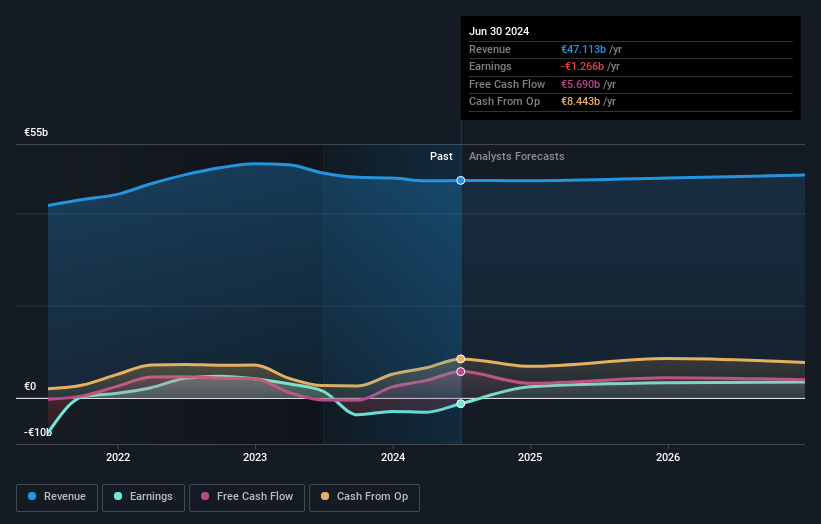Bayer Aktiengesellschaft Just Missed Earnings; Here's What Analysts Are Forecasting Now

Bayer Aktiengesellschaft (ETR:BAYN) shareholders are probably feeling a little disappointed, since its shares fell 3.4% to €26.35 in the week after its latest second-quarter results. Revenues of €11b beat expectations by 2.1%. Unfortunately statutory earnings per share (EPS) fell well short of the mark, turning in a loss of €0.03 compared to previous analyst expectations of a profit. The analysts typically update their forecasts at each earnings report, and we can judge from their estimates whether their view of the company has changed or if there are any new concerns to be aware of. So we gathered the latest post-earnings forecasts to see what estimates suggest is in store for next year.
See our latest analysis for Bayer

Following last week's earnings report, Bayer's 19 analysts are forecasting 2024 revenues to be €47.0b, approximately in line with the last 12 months. Bayer is also expected to turn profitable, with statutory earnings of €2.19 per share. Yet prior to the latest earnings, the analysts had been anticipated revenues of €46.9b and earnings per share (EPS) of €2.31 in 2024. The analysts seem to have become a little more negative on the business after the latest results, given the small dip in their earnings per share numbers for next year.
It might be a surprise to learn that the consensus price target was broadly unchanged at €35.41, with the analysts clearly implying that the forecast decline in earnings is not expected to have much of an impact on valuation. The consensus price target is just an average of individual analyst targets, so - it could be handy to see how wide the range of underlying estimates is. The most optimistic Bayer analyst has a price target of €68.00 per share, while the most pessimistic values it at €25.00. So we wouldn't be assigning too much credibility to analyst price targets in this case, because there are clearly some widely different views on what kind of performance this business can generate. As a result it might not be a great idea to make decisions based on the consensus price target, which is after all just an average of this wide range of estimates.
Looking at the bigger picture now, one of the ways we can make sense of these forecasts is to see how they measure up against both past performance and industry growth estimates. We would highlight that revenue is expected to reverse, with a forecast 0.4% annualised decline to the end of 2024. That is a notable change from historical growth of 3.3% over the last five years. By contrast, our data suggests that other companies (with analyst coverage) in the same industry are forecast to see their revenue grow 3.8% annually for the foreseeable future. So although its revenues are forecast to shrink, this cloud does not come with a silver lining - Bayer is expected to lag the wider industry.
The Bottom Line
The biggest concern is that the analysts reduced their earnings per share estimates, suggesting business headwinds could lay ahead for Bayer. Fortunately, the analysts also reconfirmed their revenue estimates, suggesting that it's tracking in line with expectations. Although our data does suggest that Bayer's revenue is expected to perform worse than the wider industry. There was no real change to the consensus price target, suggesting that the intrinsic value of the business has not undergone any major changes with the latest estimates.
With that in mind, we wouldn't be too quick to come to a conclusion on Bayer. Long-term earnings power is much more important than next year's profits. We have forecasts for Bayer going out to 2026, and you can see them free on our platform here.
Before you take the next step you should know about the 1 warning sign for Bayer that we have uncovered.
If you're looking to trade Bayer, open an account with the lowest-cost platform trusted by professionals, Interactive Brokers.
With clients in over 200 countries and territories, and access to 160 markets, IBKR lets you trade stocks, options, futures, forex, bonds and funds from a single integrated account.
Enjoy no hidden fees, no account minimums, and FX conversion rates as low as 0.03%, far better than what most brokers offer.
Sponsored ContentValuation is complex, but we're here to simplify it.
Discover if Bayer might be undervalued or overvalued with our detailed analysis, featuring fair value estimates, potential risks, dividends, insider trades, and its financial condition.
Access Free AnalysisHave feedback on this article? Concerned about the content? Get in touch with us directly. Alternatively, email editorial-team (at) simplywallst.com.
This article by Simply Wall St is general in nature. We provide commentary based on historical data and analyst forecasts only using an unbiased methodology and our articles are not intended to be financial advice. It does not constitute a recommendation to buy or sell any stock, and does not take account of your objectives, or your financial situation. We aim to bring you long-term focused analysis driven by fundamental data. Note that our analysis may not factor in the latest price-sensitive company announcements or qualitative material. Simply Wall St has no position in any stocks mentioned.
About XTRA:BAYN
Undervalued with moderate growth potential.

